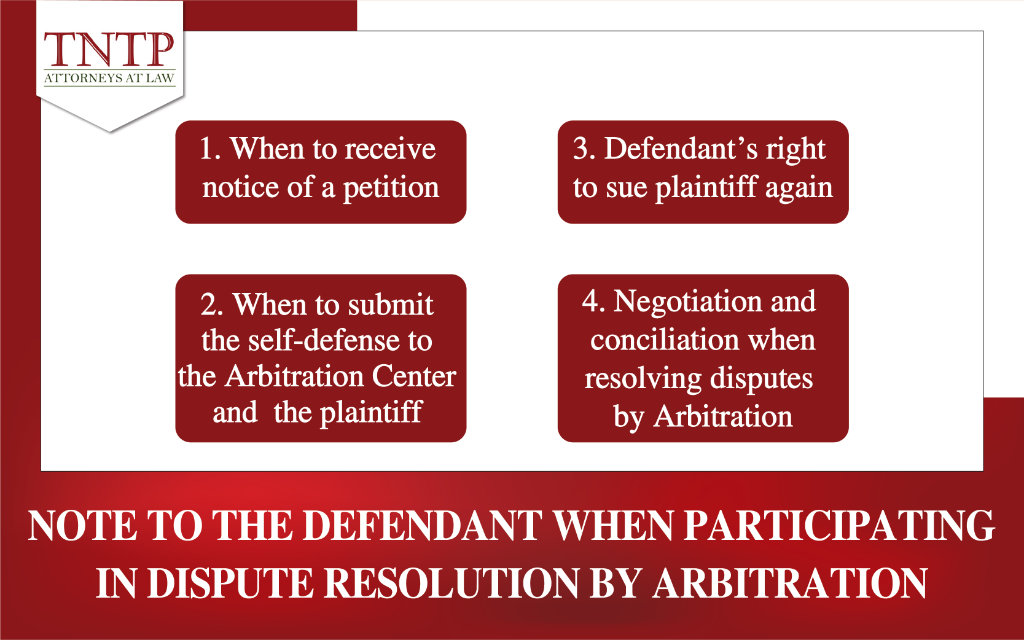In principle, the settlement of disputes by Commercial Arbitration shall be carried out when the parties have an Arbitration Agreement. In particular, the defendant is the person who is sued by the plaintiff at the Arbitration Center to ask this agency to resolve the dispute. To protect thei legitimate rights and interests, what should the defendant pay attention to when participating in dispute resolution by Arbitration? Let’s follow the article below of TNTP to find the answer.
When to receive notice of a petition
When a plaintiff sues a defendant at the Arbitration Center, it will be responsible for sending a notice of action and other relevant documents. to the defendant.
According to Article 32 of the Law on Commercial Arbitration 2010 (“Shopping Mall Law 2010”), if the parties do not have other agreements or the arbitration rules o not provide for otherwise, within 10 days from the date of receipt of the petition, accompanying documents and documents of advance payment of arbitration fees, The arbitration center will send the defendant a copy of the plaintiff’s petition and other documents accompanying the petition.
The moment the defendant receives the notice of the petition is when the defendant officially learns that he is being sued at the Arbitration Center. It is also time for the defendant to prepare a plan to best protect his rights and interests.
When to submit the self-defense to the Arbitration Center and the plaintiff
Under Clause 2, Article 35 of the Law on Shopping Malls 2010, for isputes be settled the arbitration enter, if the parties do not have other agreements or rules proceedings of the Arbitration Center without other provisions shall be within 30 days from the date of receipt of the petition and documents besides, the defendant must send the Arbitration Center a self-defense copy.This deadline may be extended if requested by one party or parties.
Where the defendant contends that the dispute does not fall under the jurisdiction of the Arbitrator, there is no arbitration agreement, invalid arbitration agreement or agreement if the referee cannot do so, it must also state that in the self-. The Defendan may take an objectionable view of the Arbitration Agreement, otherwise the Defendant will lose the right to object.
Accordingly, the self-protection includes the following contents:
- Date, month, year of self-protection.
- The name and address of the defendant.
- Basis and evidence of self-defense, if any;
- Name and address of the person chosen by the defendant to serve as arbitrator or offer to appoint an Arbitrator.
The defendant must still choose an arbitrator or ask the arbitrator center to appoint an arbitrator.
Defendant’s right to sue plaintiff again
Under Article 36 of the 2010 Law on Shopping Malls, the defendant has the right to sue the plaintiff again on issues related to the dispute.
- The defendant’s re-suit must be based on the arbitration agreement upon which the plaintiff sued the Defendant.
- The lawsuit must be filed in its form, independent of it self-protection.
The application must be sent to the arbitration centre at the same time as the Self-Defense is submitted; and
- The suit was resolved concurrently by the same Board that dealt with the Plaintiff’s
Negotiation and conciliation when resolving disputes by Arbitration
Under Article 38 of the 2010 Law on shopping malls,the parties have the right to negotiate and agree to terminate the dispute settlement. In case the parties themselves agree to terminate the dispute settlement, they have the right to request the President of the Arbitration Center to make a decision. intends to suspend dispute resolution.
When being sued in Court or Arbitration, the parties will always prioritize self-negotiation and mediation with each other to resolve disputes. This option will help the parties save time, costs, and money.Therefore, when being sued in arbitration, the defendant may consider this option to resolve the dispute with the plaintiff.
Above is the content of the article “Note to the defendant when participating in dispute resolution by Arbitration”. Hope TNTP’s article is useful to readers.
Regards.







